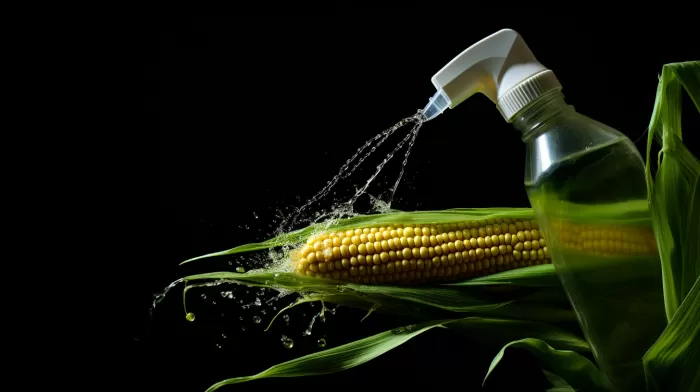Dow Chemical is on the verge of gaining approval for a new genetically modified organism (GMO), a type of corn that will enable farmers to spray huge amounts of a chemical weed killer called 2,4-D. This chemical is designed to eliminate invasive plants, and the new corn can survive 2,4-D. However, many question the impact this new GMO corn and the accompanying escalation of agricultural chemical warfare will have on farmers and consumers.
Chemical Time Bomb
The potential approval of Dow’s new GMO corn and the subsequent increased use of weed killer 2,4-D has sparked controversy. Steve Smith, the agricultural director of Red Gold, an Indiana tomato processor, has described the planned utilization of the new corn as a “ticking time bomb.” He added, “we see this new piece of it having side effects we don’t think people have adequately thought of.”
Farmers who don’t use Dow’s herbicides but have experienced the loss of crops due to the drifting residues of chemicals like 2,4-D have voiced strong objections to the innovative corn, called Enlist. John Bode, a lawyer for food firms and farmers who are seeking stricter regulations of the Dow corn and herbicides, states that this is a significant issue for farm country and adds, “massive amounts of 2,4-D can cause major changes, threatening specialty crops miles away.”
Health Effects
Some opponents of the new GMO corn have dubbed it “Agent Orange corn” since 2,4-D was an ingredient in the infamous herbicide used during the Vietnam War. Dow argues that the ingredient in Agent Orange that caused most of its damaging health side effects (like cancer and birth defects) was another chemical, 2,4,5-T, which is now banned. In contrast, the chemical 2,4-D is used by many consumers in their home lawn-care products.
However, Wenonah Hauter, executive director of Food & Water Watch, warns: “Many studies show that 2,4-D exposure is associated with various forms of cancer, Parkinson’s disease, nerve damage, hormone disruption, and birth defects. USDA (United States Department of Agriculture) must take these significant risks seriously and reject approval of this crop.”
On the other hand, the Environmental Protection Agency insists that 2,4-D has not been proven to cause cancer in humans. Meanwhile, farmers like Brooks Hurst, who grows corn in Missouri, are pushing for the GMO corn’s approval, stating, “I think it’s a crisis, and we need something to have a solution to get rid of resistant weeds.”
##_precedented_shown_with_volatilization##_Herbicide In The Air
The long-term effects of using these crops and weed killers are unknown. While there are reports that 2,4-D is particularly prone to vaporizing and traveling in the air for big distances, Dow’s spokespersons maintain that their new formulas for 2,4-D will reduce volatilization.
“This is going to be a solution that we are looking forward to bringing to farmers,” says Joe Vertin, a Dow spokesperson. Still, organic farmers and others concerned about environmental degradation and the subsequent health risks remain uneasy.
##_precedent_end_with_questionuxtap## A New Wave of 2,4-D Ready Crops
It’s worth noting that this GMO corn is only the initial phase of a new Dow program to introduce numerous 2,4-D ready crops. Cotton and soybeans that will be suitable for the herbicide are expected to follow soon. Furthermore, Monsanto is reportedly working on soybeans, corn, and cotton that can tolerate similar herbicides.
##_precedented_shon_with_outatial-effectsion## Potential Widespread Impact
If Dow’s new GMO crop receives approval and becomes widely used, the agricultural industry may see a significant shift. Farms will have to adapt their practices to accommodate the new corn and increased use of 2,4-D.
As environmental concerns grow and consumers demand more information about the production of their food, the debate over GMO crops and agricultural chemicals like 2,4-D will continue. While Dow maintains that their new GMO corn and related herbicides are safe, the potential side effects and long-term consequences warrant further investigation and regulation. Whether or not the GMO corn is approved, the larger conversation about the role of GMOs and chemical use in agriculture will undoubtedly persist.



